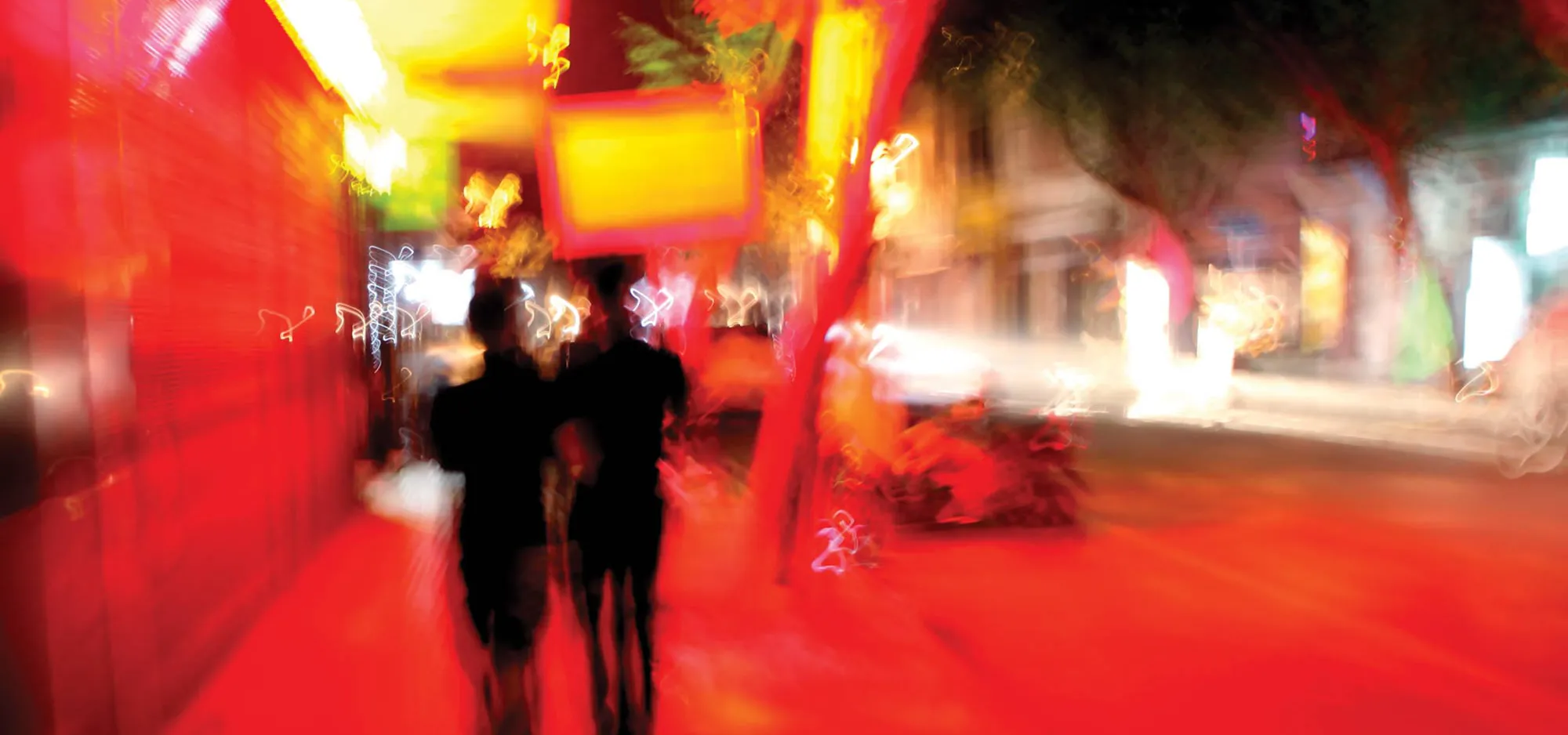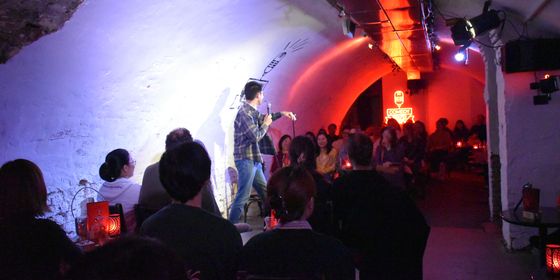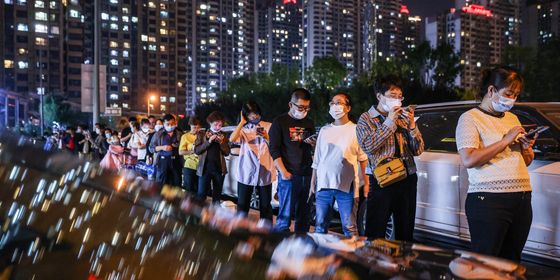Despite activists’ outcry and a shocking kidnapping case, medically discredited “gay conversion” treatments still find a market in China
It was early February, 2014, shortly after Spring Festival, when Yanzi left the warmth of Guangzhou and flew to drizzly Chongqing, to try to turn himself straight.
“Conversion therapy” for homosexuals has quietly persisted in Chinese medical circles and society for years, although the World Psychiatric Association stated in 2016 that “it has been decades since modern medicine abandoned pathologizing same-sex orientation and behavior.” The treatment includes a wide range of methods, offered at both illegal clinics and government-backed hospitals, to convince patients their sexuality can be changed: shock treatment, pharmaceuticals, or counseling sessions.
Yanzi knew he was gay, but wondered what the therapy was like—and what damage it could do.
He had been struggling with his sexuality since he was 12 and he realized he wanted to be close to another boy in class. It wasn’t until 2002, though, when he went to college, that Yanzi first understood the concept of homosexuality. But when he checked psychology books in the library, he found descriptions of his orientation as “sexually perverted.” It was only when volunteering at an LGBT NGO after graduation that he became more confident and accepting of himself.
“Then one time, I was running in a 100K [marathon] and it suddenly dawned on me,” Yanzi told TWOC. “If I could get through this physical hurdle, why can’t I accept my sexuality?”
In 2014, though, conversion therapy was a hot topic. Many of Yanzi’s fellow volunteers were talking Xinyu Piaoxiang, a treatment center in Chongqing. In television interviews, the center’s founder, Jiang Kaicheng, had been remarkably forthright about his therapy’s miraculous success in “curing” homosexuality, promising to work wonders. That was how Yanzi found himself on a flight to Chongqing, nervously fingering the recorder he’d brought along in his pocket as an insurance policy in case things went wrong; he’s arranged with another volunteer to come fetch him if necessary.
Lu Zhong (right) and Liu Wangqiang became the first gay couple to publicly hold a wedding ceremony in Fujian province in 2012. As part of the ceremony, the couple paid their respects at the grave of Lu’s late father (VCG)
Xinyu Piaoxiang wasn’t hidden away in some desolate back alley. It was located on the prestigious “Sunlight and Moonlight Plaza” in the city’s Central Business District, close to a pier with parks, a theater, and museums; its entrance is decorated with a handwritten inscription by Wu Po-hsiung, the former Kuomintang chairman and mayor of Taipei. The price for “conversion therapy” was listed openly at the reception: 30,000 RMB for five phases of six sessions.
Yanzi opted for a single 500 RMB session, and was introduced to Jiang, who claimed to be the only therapist able to “turn gays straight.” A month later, when Yanzi would sue the clinic, he discovered Jiang had no qualifications at all. He certainly didn’t look like a traditional therapist; no white coat, just a middle-aged man in jeans and jacket, with a paunch and receding hairline. His office, where he asked Yanzi to remove his shoes and lie on a sofa with his eyes closed, was hung with Buddhist paintings. Jiang spoke, and asked him to think about men having sex—then, without warning, electrocuted him with a small metal baton. “It didn’t hurt much, but the shock came at my most relaxed moment and I felt uncomfortable,” Yanzi said. He hurriedly cut the session short and left.
Over the next few weeks, Yanzi spoke with friends, including lawyers, about the potential negative impacts of the treatment; many “patients” had suffered, and some had even lost the ability to work. He decided to sue. There is no specific Chinese law to protect gay rights, but the center could sue the clinic, and their search-engine enabler Baidu.com, for false advertising.
A nurse matches patients’ names to their daily dosage of medicine at a mental hospital in Liaoning province (VCG)
The Beijing LGBT Center had begun compiling a pair of reports, on the mental health of LGBT people in China, and awareness of gender and sexual minorities among the psychiatric industry. They found that many patients had been coerced into therapy by family members; one man born in 1996 said his mother considered homosexuality “disgusting” and would rather he “commit a crime than be gay.”
Another said that after three months of shock treatment and emetic medication, he now felt nauseous at the sight of naked men. He’d lost all interest in sex—with any gender. He quit his job and spiraled into depression; it was only his family that prevented him from committing suicide. Xiaoyao, a staff member at the LGBT Center in charge of compiling the reports, blames faulty standards and a lack of regulations for allowing conversion therapy to persist.
In 1997, homosexuality was declassified as a crime in China (for decades previously, it had been prosecuted under the criminal code as a form of “hooliganism,” a catch-all term for behavior deemed morally deviant). In 2001, the third edition of the Chinese Classification of Mental Disorders (CCMD-3), published by the Chinese Society of Psychiatry, officially removed homosexuality from its list of mental disorders. However, homosexuality hasn’t been completely depathologized, and under “sexual orientation disorders,” the textbook warns that some individuals might feel anxious about their homosexuality or bisexuality, and seek change.
A patient resting at the Third People’s Hospital in Lincang, Yunnan. Wires are installed in the ward to prevent escape (VCG)
Many psychology textbooks still include conversion therapy, and practitioners have limited information of dealing with LGBT patients. No official data exists, but an informal survey has found at least 116 centers around China still offering the therapy; Qingdao University professor Zhang Beichuan, an expert on this issue, estimates there are about 16 million women trapped in sham marriages with gay men.
The LGBT Center’s reports were an important step in pushing for complete depathologization, Xiaoyao said. The center has united with other LGBT organizations across China, to take measures on the issue, training LGBT-friendly counselors, changing descriptions in other psychology textbooks, and reporting or suing clinics that still offer conversion therapy (the upcoming CCMD-4 will apparently use standardized WHO terminology).
By choosing the latter course, Yanzi put himself, as well as conversion therapy, in the media spotlight. Reporters crowded to interview him and the clinic. His parents discovered Yanzi was gay from seeing him on television; they declined to discuss the topic with their son, and even now, Yanzi said, there’s a delicate layer of pretense between his parents and him, even though Yanzi knows they object to his sexuality.
On the other hand, the lawsuit was going more smoothly than anyone expected. The case was registered in May, heard in July, and the verdict delivered on December 19, 2014. The judge had done his research, using LGBT terminology and referring to organizations and well-known figures within the field of LGBT activism. “He even told me he knew about Daxia, the partner of famous sociologist Li Yinhe. He said that [Daxia] is transgender, not a lesbian like society thinks,” Yanzi said. The verdict: Homosexuality was not a mental disorder. The clinic was ordered to issue an apology on its official website for 48 hours, and compensate Yanzi 3,500 RMB.
The victory was a milestone—the first successful lawsuit against conversion therapy in Chinese history. But it was largely symbolic: Xinyu Piaoxiang never apologized, and under Contact Information, their website still lists “sexuality correction” at a discounted rate of 40,000 RMB (when TWOC called, a man with a thick Chongqing accent answered; on being asked about conversion therapy, he paused then hung up). So Yanzi threw himself into activism, working with the LGBT community to safeguard their rights, and presenting himself as an approachable advocate for those in need of assistance; his WeChat privacy settings allow anybody to add him without his verification.
His work often involves helping others to report unsavory clinics and warning unwary clients. “Not many people would stand up and sue,” Yanzi said. “I understand them though, it’s too much pressure and trouble, and you become a public figure.”
A patient suffering from schizophrenia is bound to his bed, after exhibiting violent behavior, at a mental hospital in Shanxi province (VCG)
But a second and even more troubling case was around the corner. In October 2015, Yanzi’s colleague Ah Qiang received a WeChat message from Wang Li, a gay man claiming his boyfriend Yu Hu had been locked up in a mental institution by his wife to receive therapy. Ah Qiang’s first reaction was suspicion.
As the director of Guangzhou-based NGO Parents, Families and Friends of Lesbians and Gays, he had received his fair share of emergency calls over the years; many turn out to be hoaxes or exaggerations—couples going through breakup, and reaching out for help. He asked Wang for proof.
The next morning, Wang sent him a couple of photos and some short sound clips. One appeared to be a recording of a man, presumed to be Yu, saying that he had been locked up for a long time after a doctor diagnosed him with “sexual preference disorder.” Then the voice pleaded: “Please help me get out.”
Ah Qiang later found out Wang had gone to a lot of trouble to get the recording. Yu’s phone had been confiscated, but Wang found out that, every morning between 8 and 9 a.m., the patients were moved from one building to another for morning exercises. As Yu hid in a second-floor bathroom, Wang stood outside, and they shouted back and forth to make the recording. “It was like a movie,” Ah Qiang said.
Ah Qiang bought a train ticket from Guangzhou to Zhumadian, Henan province, more than 1,200 kilometers away, arriving the next morning. The entire way, he formed battle plans, considering how to carry out a successful rescue, then hold the hospital to account for its actions. And along the journey, he learned the story of how Yu came to be held captive in a hospital for being gay.
Yu was married with a child when he met Wang, and later came to realize he’d been living a lie. He asked his wife for a divorce; but when he arrived to sign the divorce papers on October 8, 2015, he was met with several of her relatives, who bundled him into a car and drove him to a local mental institution. He’d been there ever since.
When he arrived in Zhumadian, Ah Qiang first tried negotiating with Yu’s doctor. When that failed, he called the police, who accompanied him to see the director of hospital affairs; they argued back and forth on whether homosexuality is a disorder. Finally, Ah Qiang called a lawyer, and put him on speakerphone. The lawyer forcefully evoked the Mental Health Act, which states that hospitals cannot keep patients by force, and admission needs to be on a voluntary basis. Eventually, the hospital relented and allowed Ah Qiang to see Yu. He found the patient sitting on a bed in a cell with three others; he told his visitor that he’d been there for 19 days and force-fed unknown medication.
“His hair was disheveled, his eyes out of focus and he had a striped uniform on. He looked slouched, powerless,” Ah Qiang told TWOC. (Yu and Wang both declined to be interviewed, saying, “It’s been more than a year now and [we] just don’t want to touch the old wound again.”)
A doctor on patrol, as patients have lunch at a mental hospital in Shanxi province (VCG)
Yu was allowed to leave the hospital and return home to his family, where he pretended to have been “cured” until he saw an opportunity to escape. He and Wang moved to another city; Yanzi visited, and offered to help sue the hospital, but Yu remained traumatized by the experience and said he needed time to recover. Six months later, they approached Yanzi, who explained that their best recourse was to file a suit on the legal basis of “personal restraint” and “compulsory mental-health treatment.” In June 2016, their case was accepted at a local court and in September 2017, the court ruled the psychiatric hospital should apologize and compensate the couple 5,000 RMB. A woman at the hospital’s medical department told TWOC in December that “you can’t cure something that’s not a disease.”
To prevent people from going to such therapy in the first place, the Beijing LGBT Center has started training counselors from across the country. A leading counselor at the center, April has been practicing since 2010 and said the concept of “LGBT-friendly counseling” means being accepting and tolerant, not judgmental.
“Some of the counselors come to the training sessions set on figuring out whether homosexuality is something you are born with or an acquired trait, whether it can be changed,” she said. “But this is not what a LGBT-friendly counselor should really think about—it’s what’s bothering the visitor, the social pressure they face, and how we can help them.”
During training sessions, April hands out a questionnaire asking if participants have had same-sex relations, or ever wanted to be closer to someone of the same sex. When love and sex are broken into such detailed categories, she said, people start realizing that sexuality and gender can be diverse: A spectrum, instead of black and white.
Along with a group in Xi’an, the Beijing LGBT Center is pushing for textbook descriptions of LGBT to be changed, eliminating passages about conversion therapy, April said. They have written to individual publishers and authors; some reply, acknowledging the mistakes and promise to update their edition, while others ignore. There has been no centralized government intervention, however; depathologization is pushed mostly by people on a grassroots level, case by case, training session by session, letter by letter.
“We are not pointing fingers, we just want to point out areas for improvement,” Yanzi added, discussing the role of the state.
In his experience, when reporting a clinic to a local health bureau, officials usually say that its registration is approved by the industrial and commercial bureau. The latter in turn say conversion therapy is a medical matter. The buck is passed back and forth, while there’s no policy, act, or law that mandates such therapy is wrong.
The battle for recognition of rights can be long and wearisome for LGBT activists, as Yanzi admitted. “Of course,” he said. “But if we don’t do it ourselves, who will?”
Names have been changed to protect the identity of interviewees.
Scared Straight: LGBT Community Unites Against Conversion Therapy is a story from our issue, “Fast Forward.” To read the entire issue, become a subscriber and receive the full magazine.












